
By:
- Christine Clark
Published Date
By:
- Christine Clark
Share This:
Commencement Keynote Muhammad Yunus: Discover Yourself and You Can Change the World
‘We are all entrepreneurs, go getters and problem solvers,’ said founder of global microfinance movement to thousands at All Campus Commencement
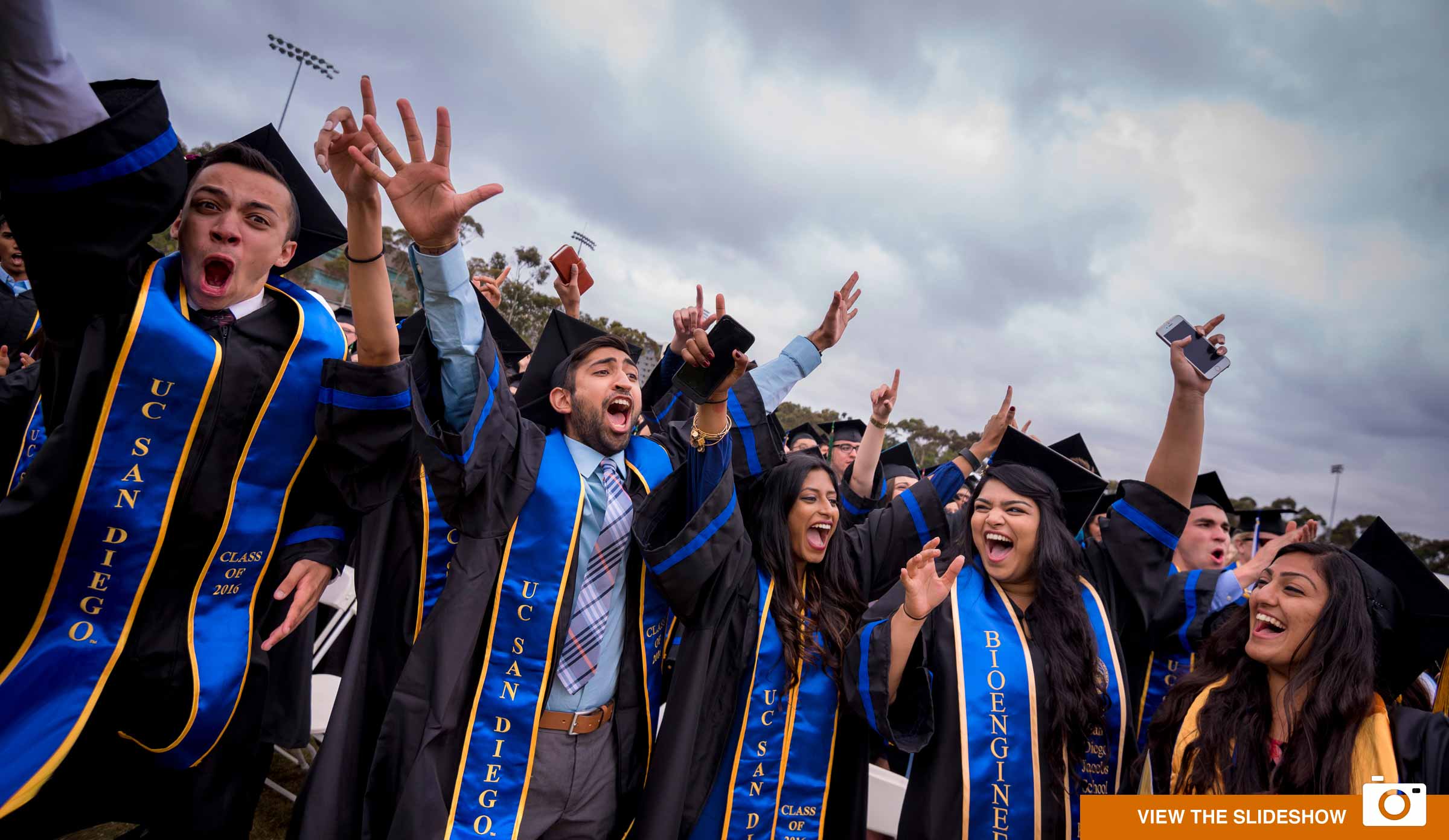
When economist and founder of the global microfinance movement Muhammad Yunus completed his doctoral studies in the United States, he soon returned to his home in Bangladesh. He said the country was rife with problems that ranged from lack of education, to extreme poverty and even famine. For any other graduate this may not have seemed like the ideal time to be starting out in life; however, for Yunus, the timing was perfect.
“It was exciting for a young person to look at those problems because I knew there was something I could do to solve them,” the Nobel Prize laureate said to thousands of graduating students and guests at the UC San Diego’s first All Campus Commencement in 16 years. He encouraged UC San Diego’s newest alumni to have the same perspective: Though the world the world may be rife with problems, each individual has the creative capacity to solve these problems in new and innovative ways.
Yunus was selected as speaker to revive the tradition of All Campus Commencement because his commitment to social mobility and human rights aligns with UC San Diego’s mission of service. He was awarded the Nobel Peace Prize in 2006 for founding the nonprofit Grameen Bank and pioneering the concepts of microcredit and microfinance.
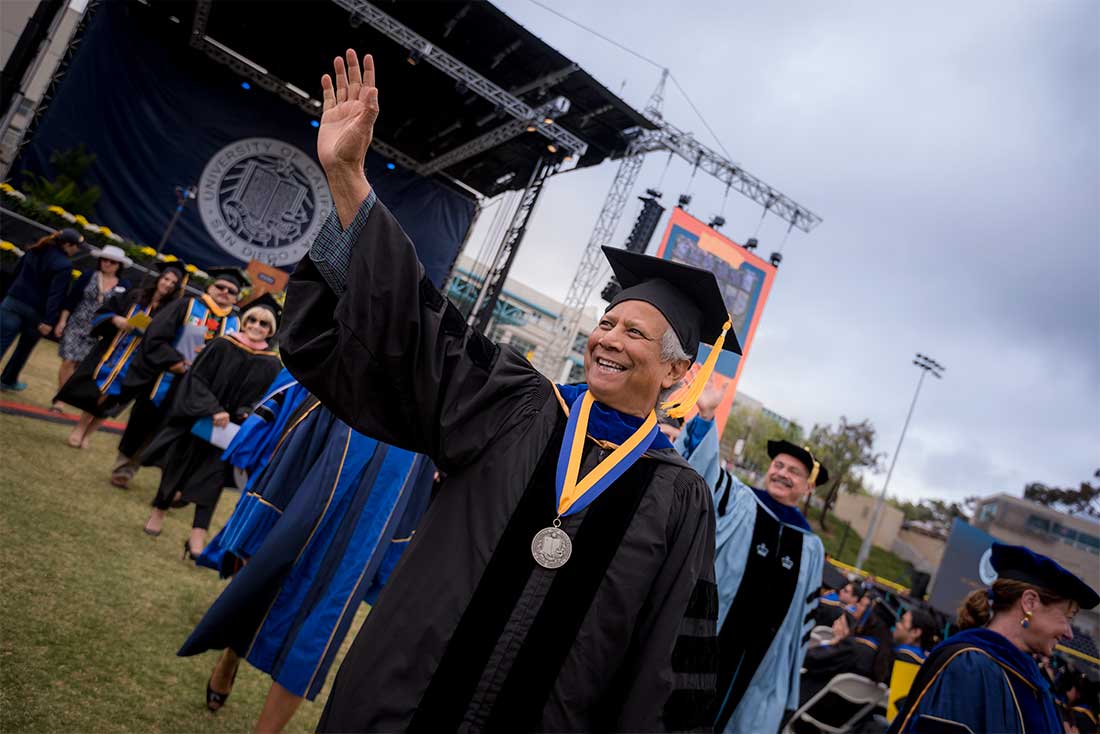
Muhammad Yunus waves to graduates. Photos by Erik Jepsen/UC San Diego Publications
“We invited Professor Yunus to be our keynote speaker because we knew that his personal story and achievements would inspire you,” Chancellor Pradeep K. Khosla said at the June 11 event. “He has devoted his life to empowering people, especially people without means. He has shown that one idea, one loan, one act of kindness can transform a life, a community and a society.”
Khosla added that UC San Diego’s graduates are poised to solve the world’s most pressing problems, and he commended them for helping UC San Diego gain recognition from Washington Monthly, for six consecutive years, as the No. 1 university in the country for contributions to the public good.
Before Yunus delivered his speech, he was awarded the UC San Diego Medal, the highest honor given by the university in recognition of significant accomplishments in life. It has only been awarded 11 times since it was first given in 1987.
Yunus shared his personal story of how he created the microfinance system by looking at problems differently. After completing his studies at Bangladesh’s Dhaka University, Yunus received a Fulbright scholarship to study economics at Vanderbilt University in the United States. He received his doctorate in economics from Vanderbilt in 1969. When he returned to his home country in the 1970s, he saw loan sharks in the villages of Bangladesh exploiting people, so he decided to lend villagers money out of his pocket.
“I saw how eagerly they were to coming to me to borrow money, so they didn’t have to go to loan sharks,” he said. “That was the beginning of something which I never dreamt would happen: creating something called microcredit. We started lending money to expand it, created a bank out of it. It started in 1976. We converted it into a formal bank in 1983, and it became a nationwide bank.”
Today, in Bangladesh the Grameen Bank has more than 8.5 million borrowers; and 97 percent of those borrowers are women. The loans are given to borrowers to start their own businesses, as these entrepreneurs don’t qualify for traditional bank loans. Over the years, the Grameen Bank, which means the village bank in Bengali, has helped people escape from poverty by providing loans on terms suitable to them and by teaching them a few sound financial principles so that they can help themselves.
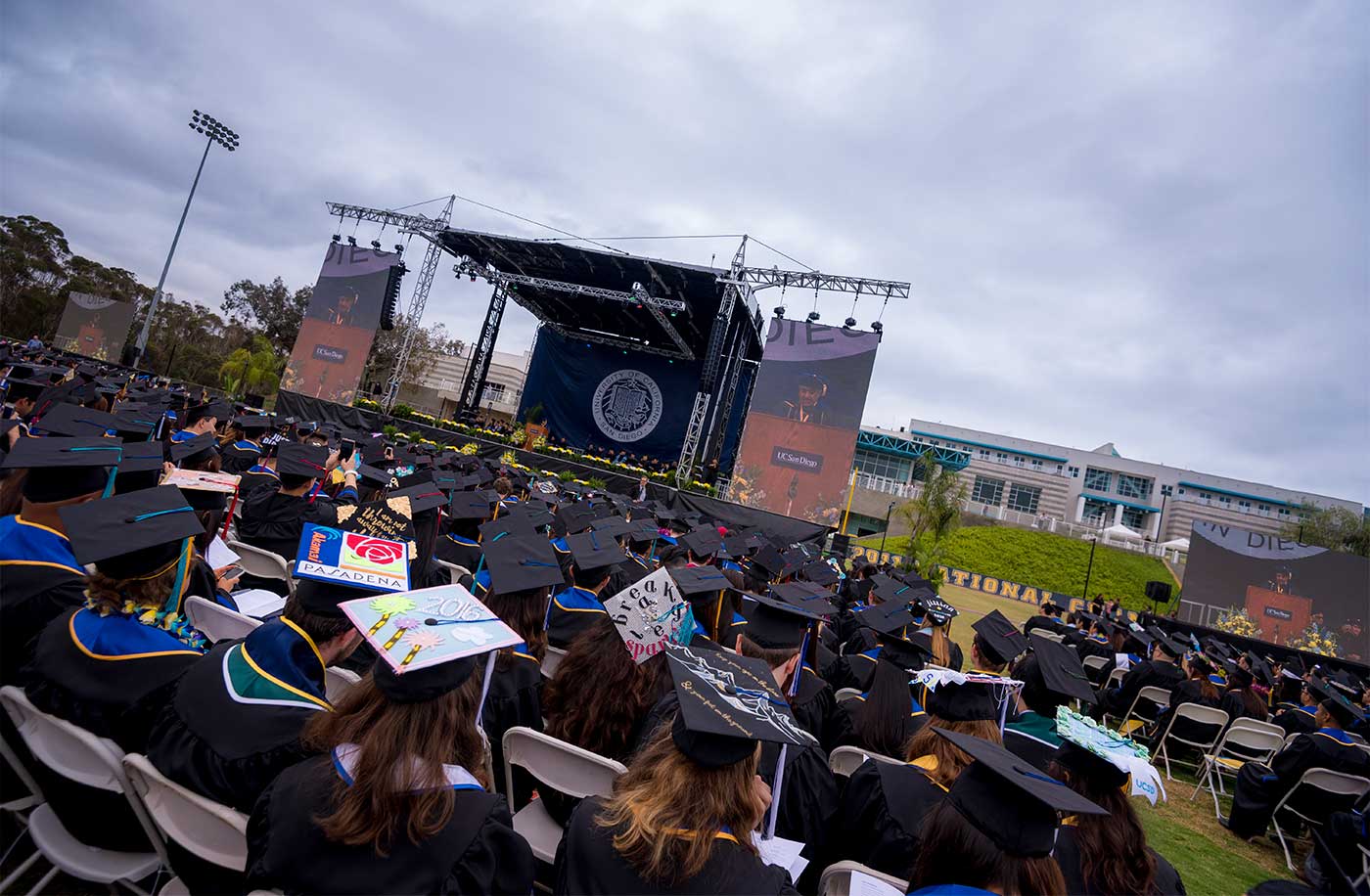
In 2006, the Nobel Peace Prize was awarded jointly to Yunus and the Grameen Bank “for their efforts to create economic and social development from below.”
Yunus explained that microcredit and the Grameen Banks does much more than just lend out small amounts of money. “Microcredit is challenging the existing banking system,” Yunus said. “We are almost opposite of conventional banking. People ask me, ‘How did you decide the rules and policies of the bank?’ It’s very simple. Whenever we needed a policy, we just looked at the conventional banks and how they do it, and then we do the opposite. They go to the rich, we go to the poor. They go to men, we go to women. They go to the city center, we go to remote villages.”
Yunus believes credit is a fundamental right and said anyone in Bangladesh can get a loan from the Grameen Bank; all they have to do is be very poor.
“In the [traditional] banking system you have to explain how rich you are, and then they give money,” he said. “The rule is, the more you have, the more you can get...Most of the problems we created in the world are because of the banking system. Take the case of wealth concentration: 99 percent of the world’s wealth is owned by 1 percent of the population…That’s not a good world.”
Yunus’s transformative economic development strategies didn’t end with creating microfinance. He said that after the bank was established, he and collaborators wanted to address other pressing problems in Bangladesh.
“We continued to look for solutions to the problems that poor people face, such as health problems, education problems, sanitation problems,” he said. “Every time I see a problem, I try to address that problem by creating a business.”
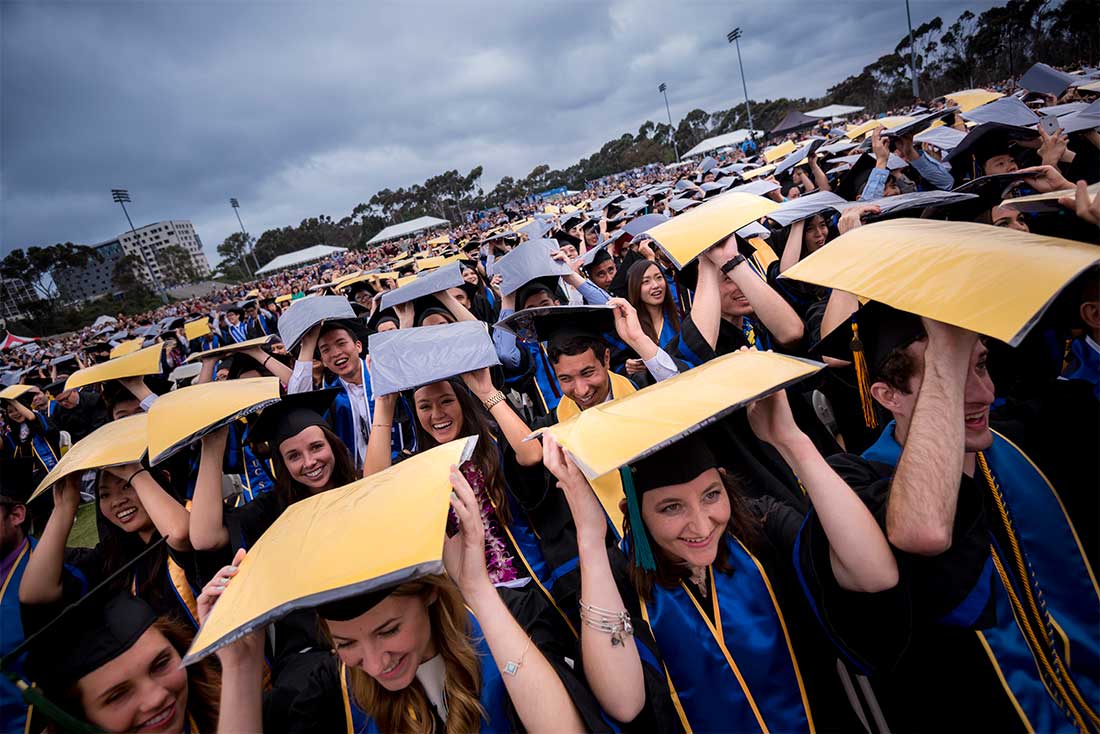
Students stood on the field to hold up place cards that together formed a giant Class of 2016 image that was captured by a drone.
Yunus, who has received numerous awards including the Presidential Medal of Freedom and the Congressional Gold Medal, said people would ask him why he was creating so many businesses and if it was for personal profit.
“I would say, ‘No, I don’t want to make personal money; I just want to solve problems,’” he said. He again realized he was challenging something else. This time, it was the whole concept of business. “There is only one type of business in the whole world: the business to make personal money.”
However, his novel business model, called social business, is defined as a non-dividend company dedicated to solving human problems.
Yunus gave some examples of successful social business he helped created in Bangladesh, such as Grameen Energy, which sells solar systems to power homes. “Bangladesh does not have much electricity,” Yunus said. “In the beginning, it was extremely difficult to sell four or five solar home systems per month, but we never gave up––20 years later, we are selling 1,000 solar systems for homes per day.”
Another problem Yunus worked to address was lack of education in Bangladesh. He started providing loans to sons and daughter of Grameen borrowers so they could go to school, and the bank achieved 100 percent enrollment of children of Grameen families. This, however, created a new problem.
“[We had] thousands and thousands of people coming out of universities and colleges with degrees, but no jobs. They kept complaining, ‘Why did we get an education if there are no jobs?’” he said. “So I asked them, ‘Who told you that you need to have a job?’ They couldn’t answer that question… Don’t look for a job; always tell yourself, ‘I am a job a creator, I am not a job seeker.’ ”
Yunus explained how he believes everyone is an entrepreneur, whether they know it or not and that, often times, people's creativity is stifled when they go to work for someone else.
“If you are allowed some part of your creativity to be used in your job, most of the time it is selling some insignificant product… otherwise it is a repetitive process,” Yunus said. “A human being is full of energy, full of creative capacity, taking a job is sacrificing the totality of this creativity…Be a creative person. Become an entrepreneur.”
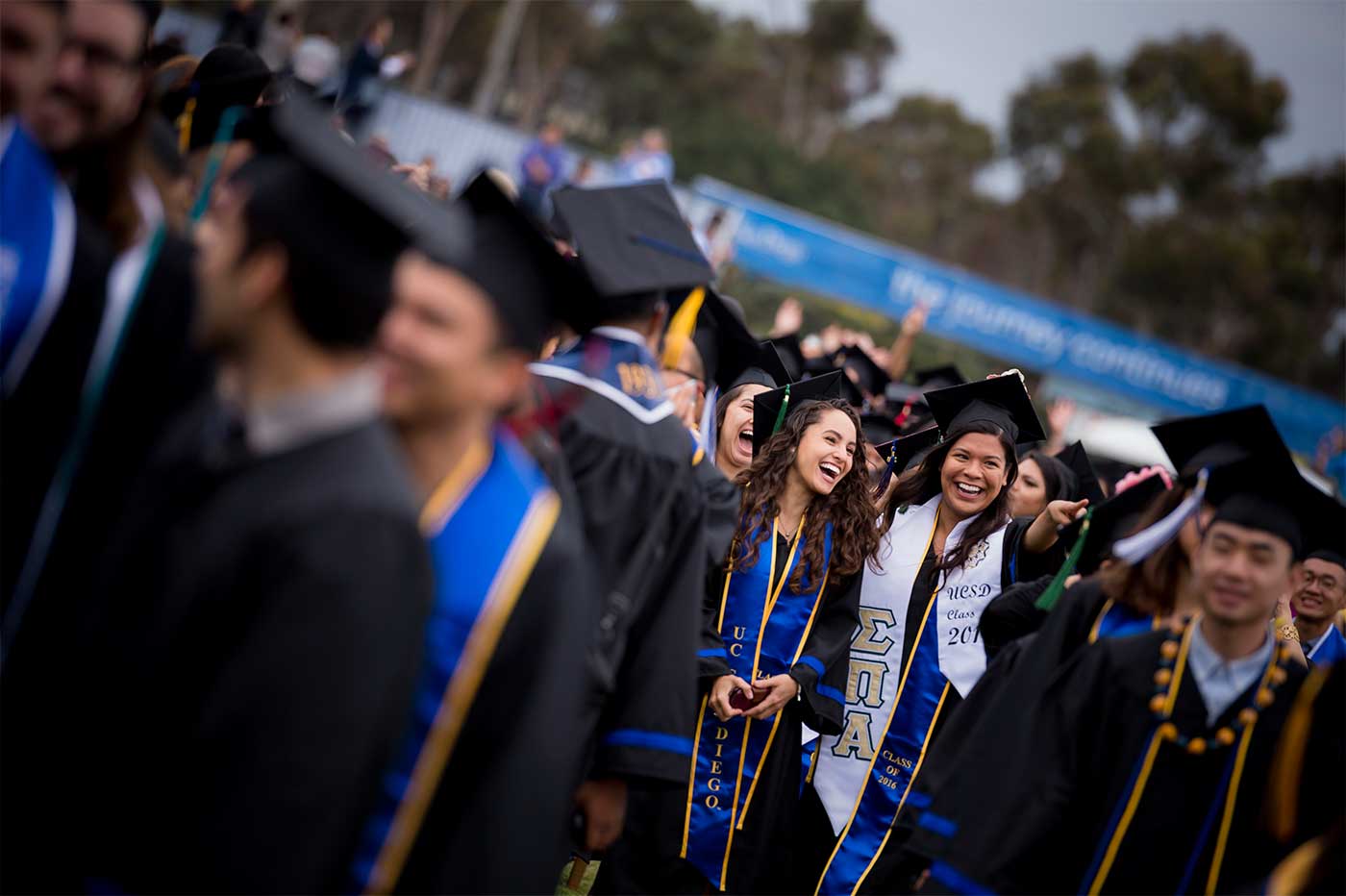
In Bangladesh, he created a social business fund for unemployed people. “We ask every young person to ‘come up with a business idea. And once you come up with a with a business idea, we invest in your business, we become your partner,’ ” he said. The social business fund has helped thousands in Bangladesh earn a living through work that is aimed at serving humanity.
Yunus believes entrepreneurs gain a stronger sense of self than a typical job seeker, and if people create their own path, they can have a more fulfilling life and, in turn, make the world a better place.
“Discover yourself,” he told graduates. “Be somebody that you want to be. Find out who you are. What do you want to do? What is the purpose of your life?”
He then explained how his purpose in life is defined by three zeros. The first is zero poverty: “I say that we can create poverty museums so that the next generation can go to museums to find out what poverty used to be like.” The second is zero unemployment: “There is no reason why anyone should be unemployed…there is nothing wrong with human beings; it’s the system that put us in the wrong direction, so we have to undo that system.” The third is zero net carbon emissions, which was met with a thunderous applause from the audience.
He concluded his speech by encouraging UC San Diego’s class of 2016 to create a new civilization. “We have to create a new civilization [because] we have a civilization based on personal selfishness and greed,” Yunus said. “We need to create a civilization based on human values. That is the challenge you have. That is why it is worthwhile going to UC San Diego… Now, make it happen.”
Share This:
You May Also Like
Stay in the Know
Keep up with all the latest from UC San Diego. Subscribe to the newsletter today.


